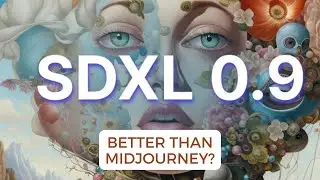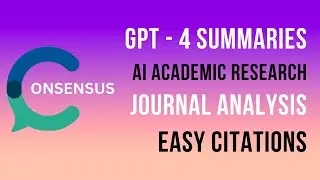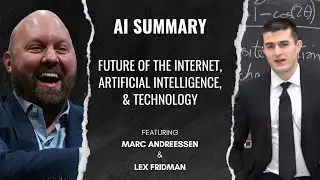AI SUMMARY - The Future Of The Internet, AI, And Technology - Marc Andreessen & Lex Fridman
Subscribe: / @kingy-ai
In this AI summary of a discussion between Lex Fridman and Marc Andreessen, aired on June 21st, 2023, Andreessen explores the future of AI, Internet technology, and how they will reshape human life and understanding. He asserts that AI assistants will make search engines redundant by providing easy access to all human knowledge. AI will also manipulate Internet content, transforming the web.
Andreessen sees large language models (LMS) as a tool for investigating controversial issues and fostering dialog on emotive topics. They could also be used to help facilitate the scientific process, despite the growing mistrust in U.S. institutions. He also discusses the potential impact of AI on the startup and big tech industries, the future of web browsers, and the importance of preserving the open nature of the Internet.
Andreessen talks about the future of search engines and suggests that AI assistants could make them obsolete in the next 5-10 years. He sees the Internet as the content for AI to manipulate. However, he also raises concerns about AI potentially cutting off a major source of future training data if there's no longer a need to create web pages.
Throughout the discussion, he highlights the potential for AI to augment human intelligence and drive advancements in various fields, while acknowledging the possible negative consequences. He advocates for a rational response to the risks of AI, rather than basing policy on untested hypotheses.
He discusses the different approaches to software and hardware development, the early days of the Internet, and how the Netscape browser made strong encryption available to the public. Andreessen also recalls the initial skepticism towards the Internet and the legal battles faced due to encryption.
In this segment of the interview, Marc Andreessen elaborates on the lifecycle of software and their inherent value over time. He further highlights the importance of human intelligence and its potential augmentation through artificial intelligence (AI), advocating for AI's role in enhancing human capabilities and its potential in fields like physics and medicine.
He acknowledges the possible negative impacts of AI, yet strongly believes in its benefits. Andreessen delves into the concept of 'Baptists and bootleggers' from development economics, applying it to the groups concerned about AI's impact. He uses the analogy of the prohibition era, comparing the 'Baptists' who are concerned about AI's moral implications and the 'bootleggers' who fear disruption of power structures.
Discussing the emergence of apocalypse cults and humanity's deep psychological need for transcendence, Andreessen warns against the dangers of basing policy on untestable hypotheses, giving the example of flawed models used during the COVID-19 pandemic.
He criticizes calls for AI regulation based on hypothetical threats, suggesting instead a more careful approach and using models as valuable tools for threat response. Andreessen notes the difficulty of modeling complex dynamic systems, stressing the importance of humility in scientific assertions.
Andreessen criticizes the high-risk community for their lack of concrete models to assess AI risks, suggesting a more systematic, science-based approach. He believes the benefits of AI outweigh potential risks and that humanity will manage the risks as they arise.
In the following hours, Andreessen covers AI in military strategies, misinformation in AI, job creation by AI, and his concerns about China's AI approach. He suggests an open-source, reason-based approach to learning, and discusses the importance of a historical perspective on technology, especially with regards to moral dilemmas and potential disastrous consequences.
Marc Andreessen covers an array of topics, including the role of nuclear weapons in averting World War Three, misinformation in the AI field, and the complications surrounding the censorship of AI models. He highlights the dangers of implementing stringent controls on AI, which he fears could lead to an authoritarian society. Nevertheless, he recognizes the need for checks and balances to prevent the misuse of AI technology.
Andreessen also addresses the growing omnipresence of AI, its implications for job markets, and the threat of AI dominance by authoritarian regimes like China. While acknowledging potential negatives, he maintains an optimistic view, asserting AI could contribute to reducing inequality and creating opportunities.
#lexfridman #marcandreessen #AIsummary



















![Learn Photoshop's New Generative Expand (AI) | [7 Methods]](https://images.videosashka.com/watch/z7cgvqe3CYI)











